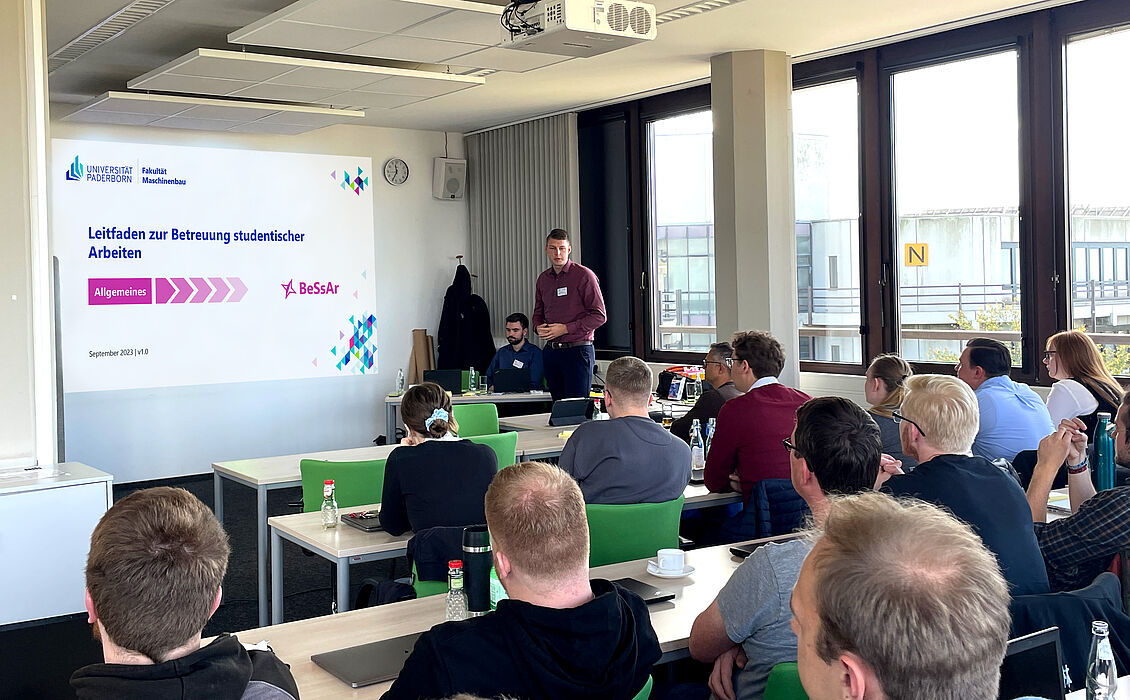The Faculty of Mechanical Engineering has launched the BeSsAr initiative together with the "Product Creation" workgroup - a project to improve the supervision of student theses. The result: a new, practical guide with illustrative examples and many best practices from all chairs of mechanical engineering. This is now being expanded to include a guide directly for students.
Academic staff in the Faculty of Mechanical Engineering play a central role in the supervision of student work. They support students in their projects, from the initial concept to submission. Bachelor's, student research projects and Master's theses should achieve scientific depth on the one hand, but also include practical relevance on the other - and of course fulfil all formal requirements at the same time: Workloads should be adhered to, requirements must be appropriate and the duration must fulfil all formal requirements. The Faculty of Mechanical Engineering is addressing the challenges in this environment with the project ‘Improving the supervision of student theses’ (BeSsAr for short). It thus exemplifies continuous improvement: Feedback from regular student surveys is the motivation to create a faculty-wide standard in the supervision of student work.
The project team in Professor Iris Gräßler's “Product Creation” workgroup is expanding the central phases of a student's work to include practical tips and recommendations. To this end, interviews were conducted with experienced academic staff from the mechanical engineering departments and best practices were derived - ‘from the mid-level faculty, for the mid-level faculty’ was a central motto of the project team led by Dr Jens Pottebaum, senior engineer and project manager as well as mid-level faculty representative. The result is a 100-page guide that not only provides relevant, practice-orientated basics for supervision in the various phases of a student's work, but also practical templates, checklists and guiding questions. How do I organise an initial meeting with an interested student? What information do I need from them? What do I need to give them? The guide contains practical guiding questions and checklists for conducting such discussions.
The first workshop based on the guidelines took place in autumn 2024 and was attended by over 30 academic staff. This workshop imparted basic knowledge on supervising student work and discussed tried-and-tested methods. The participants emphasised in particular the development of skills in early years of service and the exchange of ideas across departments: as a result, the participants requested that these workshops be held regularly and that the content be intensified with in-depth examples and practical exercises. Professor Iris Gräßler emphasises the importance of the initiative: "Through the guidelines and joint workshops, we are creating a uniform standard in the supervision of student work. This benefits not only the lecturers, but above all the students." She also sees potential for a university-wide expansion: "We pick up on existing offers for lecturers and students and draw attention to them, such as the Centre for Language Teaching. And that's exactly where we can continue - and ultimately make studying in Paderborn even more attractive."
The guidelines and supplementary resources are intended for the further training of academic staff. They can be used for individual supervision as well as customised for specific chairs. And there's more: ‘Supervisors are only one side of the coin,’ explains Jens Pottebaum. ‘That's why we are already working on a supplementary guide for students, which will also offer students practical tips and guidance for their theses.’ This will also incorporate valuable feedback from interviews with students. A pilot seminar is scheduled to take place as early as spring 2025, in which the content will be tested and further developed based on student feedback.
This text was translated automatically.


